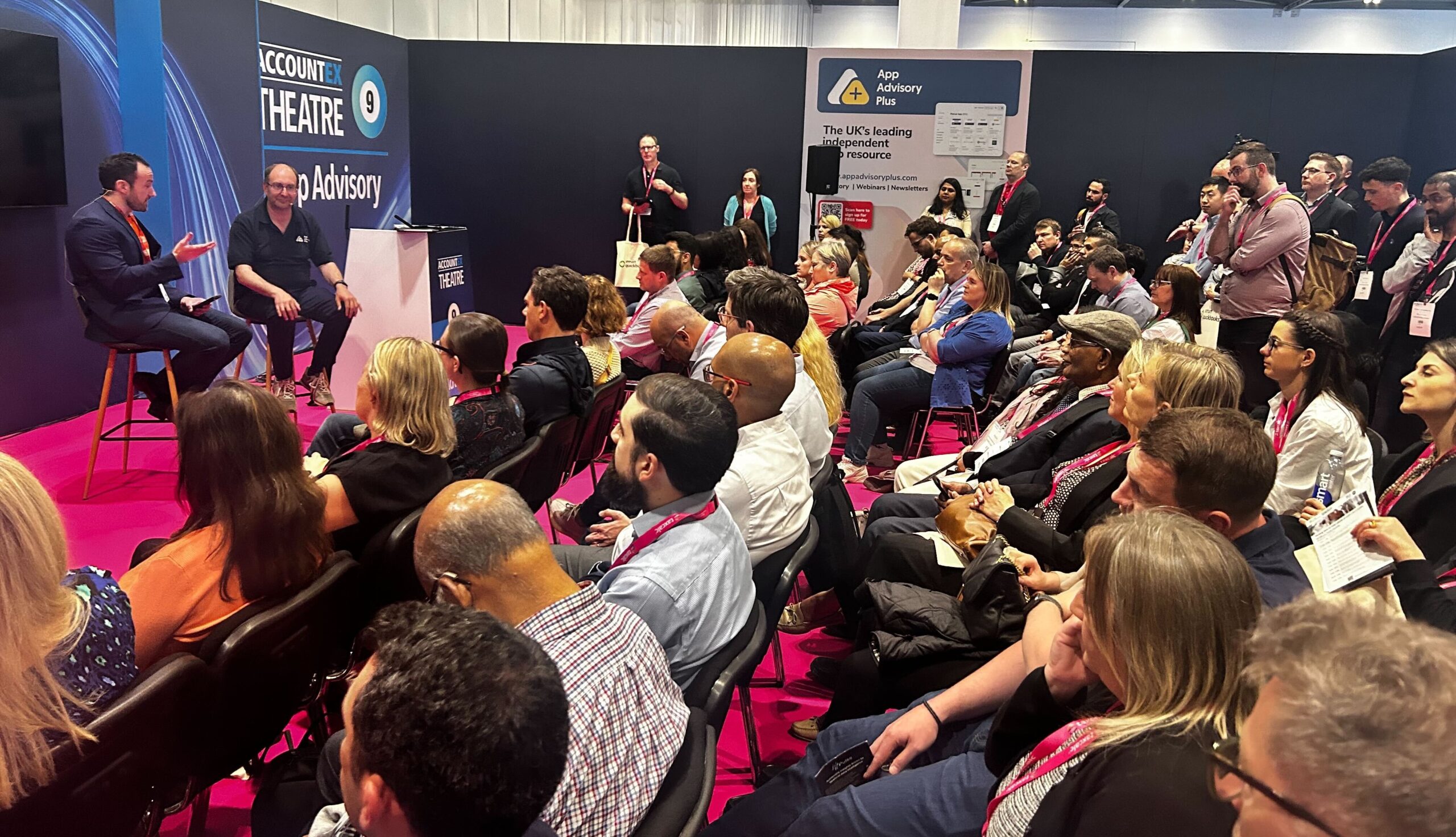- ProductExplore our bookkeeping automation features
- SectorsBusiness benefits and key sectors
- Pricing
- ResourcesAccess support, learn and grow
The Future of AI and Machine Learning in Accounting and Bookkeeping

The integration of Artificial Intelligence and Machine Learning in accounting and bookkeeping as well as its implications for the industry has been, undoubtedly, the most exciting subject of the past years. During Accountex London 2024, our Chief Product and Technology Officer Stephen Edginton joined Will Farnell, Co-founder of App Advisory Plus, in a discussion about the rapid advancement of AI - including the importance of human expertise alongside technology, challenges in adopting AI and ML technologies, and the potential for AI to transform business practices and career opportunities.
Here are some of the highlights from their conversation.

The Transformative Power of AI and Machine Learning
Will Farnell started by highlighting the growing importance of AI in the accounting industry. "What's the impact of AI and Machine Learning on us, as accountants and bookkeepers? It's really something that we all need to be thinking about". The conversation quickly turned to the pivotal moment in November 2022 when ChatGPT brought AI to the forefront of public consciousness. Farnell recalled, "Suddenly everyone's worried about losing their jobs, thinking the world's going to change overnight". This shift sparked widespread concerns about job security and the potential for AI to fundamentally alter the landscape of work.
Stephen Edginton shared insights into how Dext leverages AI to streamline bookkeeping processes. "Dext uses AI to process and help with bookkeeping automation. We get invoices, receipts, and other paperwork into systems like Xero and QuickBooks very efficiently", he explained. The company employs AI and Machine Learning scientists alongside product development teams to enhance their automation capabilities. This technology allows accountants to focus more on value-added tasks, enhancing their productivity and service offerings.
Discover Dextension, Dext’s most recent feature launched at Accountex London 2024.
Challenges and Misconceptions
One of the central themes of the discussion was the balance between human expertise and technological advancement. Farnell highlighted the rapid changes in AI. "Predictions by McKinsey now suggest that 60-70% of current tasks will be automated by 2030, presenting both challenges and opportunities", he noted. This acceleration from the initial 2042 timeline indicates how quickly AI technology is evolving. While some predictions can seem daunting, they also highlight the potential for professionals to shift their focus toward more strategic roles.
“So 60% of everything that we do today, we're not going to be doing in six years time. What a frightening prospect that could be. But equally, what a fantastic opportunity it could be as well. If accountants and bookkeepers can get technology to give them 60% more time to spend in conversations with clients, that has to be a good thing, right?” - Will Farnell
Edginton emphasised the importance of context in effectively utilising AI: "These models need context and data to be effective. For example, AI can now translate live conversations and perform complex tasks that were unthinkable 20 years ago". However, he also pointed out that AI's intelligence is often overestimated, and it's crucial to understand its limitations and strengths. "Intelligence is very hard to even quantify. What does it mean? Is it an IQ? Is it the ability to do something?", he questioned, illustrating the complexity of defining AI's capabilities as the technology evolves.
To exemplify how technology will be working alongside professionals, Farnell raised the fact that many companies now have AI tools called “co-pilot”, highlighting that the clue is in the name.
“The fact that we're talking about co-pilots and not autopilots. So if you think about the car driving analogy: you have cars that will effectively break when needed, keep in lane and everything else - but if you take a finger off the wheel, it will cancel the autopilot. That's the same way that we're going to think about how this technology helps us in our firms.” - Will Farnell
Adoption and Integration of AI and ML
The discussion also touched on the slow adoption rates of AI and cloud accounting tools. Farnell highlighted that "only 37% of Xero organisations have bank feeds connected, and 31% are using pre-accounting tools, which is likely an overestimate". This slow adoption is a significant barrier to realising the full benefits of AI and ML. Despite the technological advancements, many firms are hesitant to integrate these tools into their workflows.
Edginton firmly believes that the future of the accounting profession is a collaborative one, where AI and humans work together, as he said before. The role of accountants will evolve, with AI expanding their capabilities rather than replacing them.
“One question people have is, ‘have I still got a job? Is everything going to change? Will bookkeeping be completely automated?’, and the reality is: you'll just do more with less.” - Stephen Edginton
It’s with this certainty that he advised firms to embrace AI to remain competitive. "Firms must integrate AI into their workflows. AI tools like Dext can automate data entry and improve client interactions". Using a practical example, he drew parallels with the agricultural industry, explaining how automation increased productivity.

“We had loads of people farming, it's very human, people-powered. Then tractors came along, and that same person could do more work - but then other people had to support the supply chain and look after the tractor. When that tractor then becomes autonomous, maybe that one person is now supporting multiple tractors. We're going to see similar things play out here. If you're not using technology in your bookkeeping, in your accounting practice, you're not going to be able to get to the productivity levels that others are at.” - Stephen Edginton
Here’s more on why AI won’t replace accountants and bookkeepers.
Future Developments and Strategic Implementation
Looking ahead, both speakers were optimistic about the future of AI and ML in accounting. Edginton envisioned a future where AI tools would enable new business models and improve existing processes. "Virtual receptionists, for example, can manage client bookings more efficiently. Future AI tools will help accountants provide better advisory services by analysing extensive client data quickly", he predicted. The development of multimodal AI, capable of interpreting and responding to various inputs such as text, audio, and video, will revolutionise client interactions, making processes smoother and more efficient.
Farnell echoed this sentiment, emphasising the importance of staying updated with AI advancements and how the technology will change and create careers, such as prompt engineers. “Accountants and bookkeepers have the opportunity to see how all their clients work and take the learnings from each one to systemize that process and train others to work in the same way”, he said. By leveraging the technology, accountants and bookkeepers can enhance their productivity and focus on delivering greater value to their clients.
“We need to have these conversations with vendors that we're partnering with, too. We're going to rely on our software partners to build the AI that's going to let us stay competitive and do the things that we need to do - so we need to be asking them those questions. How are you looking at using AI? Where do you see the roadmap going? What's going to be important?” - Will Farnell
Edginton also discussed the importance of data quality in maximising AI's potential. "These models can't give you accurate advice without high-quality data. The health of your clients ultimately determines the health of your firm", he explained.
“These models are only as good as the data they're trained on, so it all comes back to context, data, and the questions you ask. The best thing you can do to stay relevant is to make sure you're leaning into these tools to drive productivity, but you're also focused on getting high quality data and asking the right questions.” - Stephen Edginton
Don’t know where to start? Find out how to implement AI for bookkeeping in your practice.
Embracing the Future
The conversation between Edginton and Farnell highlighted the transformative potential of AI in accounting. While challenges remain, the opportunities for increased efficiency and enhanced service delivery are immense. By embracing AI and focusing on continuous learning, accountants and bookkeepers can navigate the evolving landscape and thrive in the future. As Edginton summarised, "The best thing you can do to remain relevant is to lean into these tools to drive productivity and focus on getting high-quality data and asking the right questions."
As the industry continues to integrate Artificial Intelligence and Machine Learning, professionals must stay informed and proactive in adopting these technologies. The future of accounting is undeniably intertwined with the advancements in AI and ML, promising a dynamic and innovative era for the profession. By embracing the technology available, accountants and bookkeepers can not only enhance their efficiency but also provide more strategic and insightful advisory services, ultimately adding greater value to their clients.
***
Check out The Accountant’s Guide to Artificial Intelligence.
Explore the power of Dext: start a free trial today!